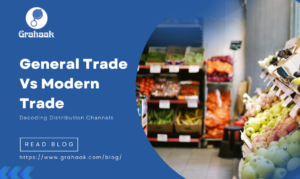General Trade vs Modern Trade, Modern Trade vs General Trade
General Trade vs. Modern Trade in FMCG: Decoding Distribution Channels

The Indian FMCG (Fast-Moving Consumer Goods) industry is the world’s fourth largest, contributing a whopping US$167 billion to the country’s GDP in 2023. Further, an average Indian household uses over 16 different FMCG products every single day. But how exactly do these products reach your home?
The answer lies in a complex network called distribution channels. These channels act as the bridge between FMCG manufacturers and the final consumers, ensuring a smooth flow of products from factories to store shelves (or even directly to your doorstep!). A big chunk of the market is operated by general trade whereas new retailers and big businesses are more inclined towards modern trade. Could add a pictorial representation of how the distribution channels work. Could add a pictorial representation of how the distribution channels work.
Understanding these channels is imperative for any FMCG company aiming to optimise their business operations. So, let’s dive deeper into the world of general trade vs modern trade.
Understanding Different Distribution Channels in the Indian FMCG Landscape
In the FMCG sector, a network of channels plays a crucial role in bringing everyday essentials like cookies to consumers across the country.
This network is called a distribution channel, and it’s like a highway connecting manufacturers to the retail store (final point of purchase).
Let’s understand the key players on this highway:
- Manufacturers: These are the companies manufacturing FMCG products, like HUL, Nestle, or ITC.
- Distributors: They act as intermediaries between manufacturer and wholesaler. They buy products in bulk from manufacturers and then distribute them to wholesalers and retailers.
- Wholesalers: They buy large quantities of products from distributors and then sell them in smaller quantities to retailers, particularly smaller stores that individual distributors might not be able to service directly.
- Retailers: Finally, we reach the final point of purchase – the retail shops. Retailers can be of various types, which we’ll explore in detail later.
The specific structure of the distribution channel can vary depending on the product category and target market. However, understanding these key players is crucial to grasping the complexities of getting your favourite FMCG product onto the shelf.
Now, let’s discuss the two main categories of retailers in India’s FMCG sector: General Trade (GT) and Modern Trade (MT).
General Trade: The Cornerstone of FMCG Distribution in India
General trade encompasses the smaller, independent stores well known as kirana stores. These handy convenience shops are conveniently located around the corner of every street in India. 90% of trade in India happens through general trade. So, they may be compact, but their reach is undeniable.
According to a 2023 report by Nielsen, a leading market research firm, a staggering 75% of FMCG sales in India still flow through this traditional channel.
This means that the majority of FMCG products you buy, from your go-to shampoo to that instant noodle pack, likely made a pit stop at a friendly neighbourhood store
before reaching your shopping basket.
The USP of these stores lies in the bond between the shop owners and their customers. Many general trade outlets offer a personalised touch, where the shopkeeper recognizes your preferences and might even extend you credit for regular purchases.
Modern Trade: The Rise of Organized Retail in India
While General Trade reigns supreme in terms of current market share, a new wave is rising in the FMCG industry that is Modern Trade (MT). This segment comprises the organised retail giants we’re increasingly familiar with like supermarkets, massive hypermarkets, and budget-conscious discount stores.
These stores are typically part of large chains, ensuring consistency in layout, product offerings, and even pricing across outlets. Unlike the intimacy of a local kirana store, Modern Trade offers a wider product variety.
But what truly sets Modern Trade apart is its focus on promotions and deals. These stores leverage their bulk buying power to negotiate lower prices with manufacturers, often translating to attractive discounts and special offers for customers.
However, the battle for consumer loyalty isn’t a one-sided affair. Let’s delve deeper into the key differences between General Trade vs Modern Trade, where we’ll compare them across various factors to help you understand which channel might be the best fit for your FMCG brand.
General Trade vs. Modern Trade: A Comparative Analysis
| Factor | General Trade | Modern Trade |
| Store Size | Small, Independent | Large, Multiple Store, Chain |
| Product Range | Limited | Wide Variety |
| Pricing Strategy | Fixed MRP (Manufacturer’s Recommended Price) | Promotional Discounts |
| Customer Experience | Personalized Services, Credit Facilities | Self-services, emphasis on convenience |
| Reach | Widespread, Local presence | Primary Urban Locations |
General Trade: Pro’s and Con’s
On the plus side:
- General Trade has a strong local presence across India. Their accessibility in almost every neighbourhood makes them the go-to option for quick purchases and forgotten essentials.
- Consumers get personalised services in General Trade. The shop owners interact with consumers, they know their preferences and most of the time they also offer credit facility to their loyal consumers.
- General Trade can adapt their product mix based on local preferences and quickly respond to changing consumer demands. This allows brands to experiment with new offerings and promotions in a targeted manner.
However, there are also limitations to consider:
- Due to their smaller size, General Trade stores often have limited shelf and shop space. This restricts the variety of products they can stock, potentially hindering brand visibility for niche or new offerings.
- With smaller margins compared to modern trade, general stores might set slightly higher prices to maintain profitability.
- Brands have less control over product placement in General Trade stores compared to modern trade.
Modern Trade: Pro’s and Con’s
Modern Trade boasts several advantages which are as follows:
- First and foremost, it offers a wider product selection.
- Secondly, Modern Trade leverages the power of bulk buying, allowing them to negotiate competitive pricing with brands. This translates to potentially lower prices for you, the consumer
The challenges or disadvantages of modern trade could be:
- Modern Trade outlets have stricter listing requirements, ensuring only high-quality products make it onto their shelves.
- The intense competition within modern trade often leads to fierce price negotiations with brands. While this benefits consumers with lower prices, it can squeeze profit margins for brands.
- The focus on efficiency and product variety in modern trade can sometimes result in less customer interaction.
So, while Modern Trade offers a modern shopping experience with wider choices and potentially lower prices, it comes with its own set of challenges for brands. The key lies in finding the right balance between these two distribution channels to ensure peak performance in the Indian FMCG market.
Conclusion: General Trade Vs Modern Trade
The Indian FMCG industry thrives on a dynamic interplay between General Trade (GT) and Modern Trade (MT) channels. While General Trade offers widespread accessibility and personalised service, Modern Trade provides a wider product variety and attractive promotions. Understanding these strengths and weaknesses is crucial for FMCG companies to navigate this diverse market.
In today’s competitive environment, a robust distribution strategy is no longer a luxury, it’s a necessity. Companies need to effectively reach both the familiar corner shops and the large supermarkets to maximise their reach and brand visibility.
This is where Grahaak steps in. Our software solution empowers businesses to excel in both General Trade and Modern Trade channels.
By leveraging Grahaak’s comprehensive features, FMCG companies can bridge the gap between traditional and modern trade, ensuring they reach every “grahaak” (customer) effectively.
Remember, a happy customer today leads to brand loyalty and future sales success. So, take control of your distribution network with Grahaak.



